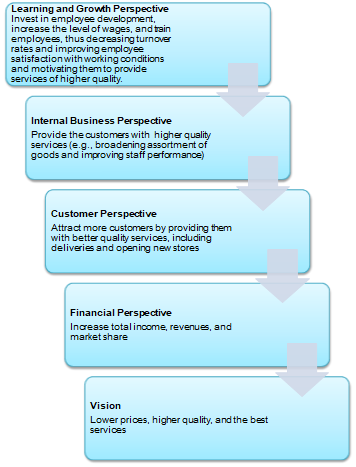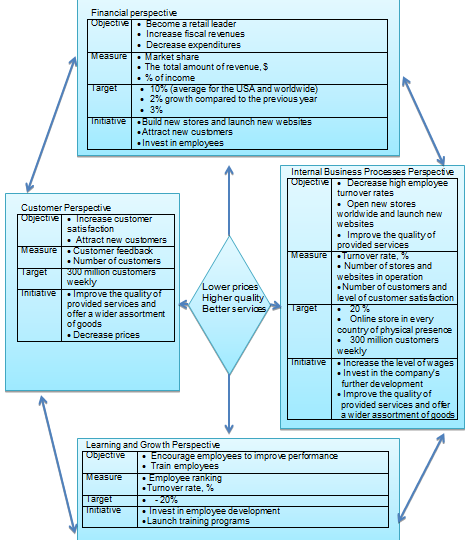The Balanced Scorecard is a performance management tool that evaluates a company’s success from four perspectives: financial, customer, internal processes, and learning and growth. This case study presents a Walmart balanced scorecard. It analyzes financial data, customer satisfaction surveys, internal process efficiency, and employee training programs. Having identified the strengths and weaknesses in these areas, the balanced scorecard of Walmart provides insight into how the company can use the tool to achieve long-term success.
Walmart Balanced Scorecard: 4 Perspectives
Financial Perspective
Objective: To become a retail leader by increasing fiscal revenues and decreasing expenditures related to training new employees because of high employee turnover rates
Measure: There are several measures for estimating progress in achieving this objective. These are the market share, the total amount of revenue in US dollars, and the annual growth of income measured in percentage by comparison to the previous year.
Target: The target for the company’s market share would be 10%. This figure is an average of the American and global markets because they are uneven. That said, market share in the US is around 10% at the present time. However, market shares worldwide are lower (2 – 8%). Therefore, the primary objective is to reach equal market shares. Other targets are 2% growth of revenues and 3% of income (Walmart, 2015). These figures are the company’s common growth rates, and any slower pace would be an indicator of worse performance.
Initiative: The best initiative to achieve financial perspective objectives are to build new stores and launch new websites with an eye to strengthening the company’s physical and e-commerce presence in both domestic and foreign markets, attract new customers by widening the assortment of goods and improving the quality of services, and investing in employees for the purposes of raising customers’ satisfaction levels and decreasing expenditures related to high turnover rates.
Reason: If Walmart wants to become a retail leader, it should focus on opening new stores and investing in employees. These steps are the foundation for attracting new customers and receiving greater income, as more stores and better services equal higher levels of attractiveness and income.
Customer Perspective
Objective: To increase customer satisfaction and attract new customers, by offering a greater assortment of goods and services, while at the same time decreasing prices.
Measure: Customer satisfaction can be measured by both customer feedback and the number of customers.
Target: There is only one target pertaining to the measures mentioned above – increasing the number of customers to 300 million per week. The motivation is the idea that the evident desire to return to Walmart and continuous growth of the customer base implies positive feedback and reflect customer satisfaction as a whole.
Initiative: Walmart should focus on further improvement of the quality of provided services, including shipping services and employees’ performance, as well as offering a wider assortment of goods. Taking steps aimed at decreasing prices would also be beneficial for making the stores more attractive, thus increasing the number of customers visiting Walmart per week.
Reason: As of now, more than 260 million customers visit Walmart per week (Walmart, 2015). These figures represent the position of the stores in the United States. Further increase in the customer base would signify the growth of the company and strengthening its position in the domestic market. However, the same measures should be taken in foreign countries, in order to improve the international image of Walmart.
Internal Business Processes Perspective
Objective: To open new stores and launch new websites; to deliver necessary system solutions such as broadening the stores’ assortment of goods and services and developing new strategies for countering competitors.
Measure: Measures describing the objectives mentioned above are the number of customers, stores, and operating websites, as well as the employee turnover rate. The motivation for including these as measures is the fact that they represent inner balance in the company and the level of business strategy development.
Target: Primary targets are increasing the number of customers to 300 million visitors per week, launching websites in all countries where the company has a physical presence, and decreasing turnover rate to 20%.
Initiative: Investing in the company’s further development, as well as in training employees, would solve some of Walmart’s problems, such as high turnover rates, and help reach the set objective.
Reason: As of now, the turnover rate is around 50%. Such a spectacular figure is damaging to the company’s performance and image. It also signifies that employee performance is low, which leads to poor customer satisfaction. If the company keeps on investing in employee development and opening new stores, it will make Walmart more stable, improving the atmosphere within the company and making it more attractive to shareholders.
Learning and Growth Perspective
Objective: To train employees, encouraging them to develop and improve performance and, at the same time, decreasing high employee turnover rates.
Measure: There are both inner and outer measures pertaining to the objective mentioned above. The inner measure is employee ranking, which might serve as a motivation for further development and measuring skills. As for the outer measure, it is the turnover rate. The motivation for stating that the rate of employee turnover is an outer measure is the fact that, unlike employee ranking, it is visible to shareholders.
Target: The primary target is decreasing turnover rates to 20%.
Initiative: Investing in training employees and raising their performance is the central initiative for achieving the initial objective.
Reason: Nowadays, turnover rates are extremely high. They highlight the existence of inner problems and gaps in organizing labor. Moreover, if employees are dissatisfied with their working conditions, they are not interested in providing superior – or perhaps even adequate – service, leading to customer dissatisfaction. That said, investment in employee development is the foundation for Walmart’s future success.
Recommendations for Walmart References
In order to improve operational effectiveness, Walmart should implement the initiatives mentioned in the balanced scorecard. The company should start with investing in employee development because without increasing the level of customer satisfaction based on employee performance, other steps would be inefficient and possibly damage the business.
Even though Walmart has recognized the paramount role of employee performance in customer satisfaction and invests in employee development (Walmart, 2015), the company should pay even more attention to this aspect of business development than to building new stores, because people are the foundation of success, seeing that they work with customers.
Another recommendation is to invest in the further development of the company in both domestic and foreign markets. This step implies strengthening Walmart’s positions and improving its image by opening more stores, launching new websites operating in all countries where the company has a physical presence, widening the assortment of offered goods and services, and decreasing prices. Further recommendations include approaching new markets and increasing market share abroad.
These two steps are the most significant ones for reaching higher levels of customer satisfaction, increasing the number of customers, and improving financial performance. Altogether, they will add to the company’s attractiveness and help turn into reality its vision and mission – saving people’s money to make their lives better, and becoming a global leader in the retail industry.
References
Walmart. (2015). 2015 annual report. Web.
Appendix 1. Walmart Strategy Map

Appendix 2. Balanced Scorecard Walmart
